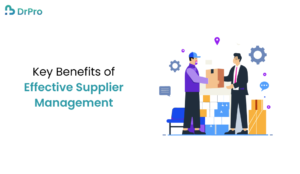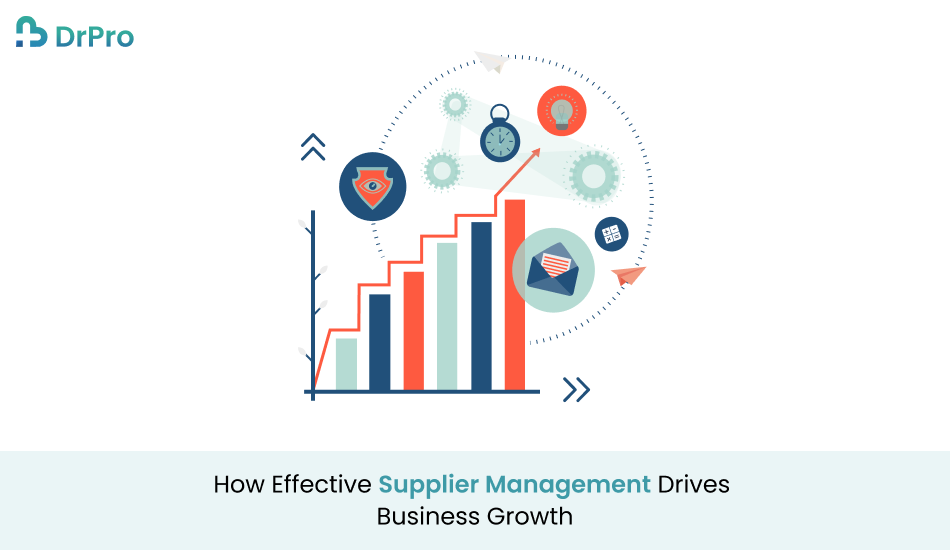Effective supplier management is essential to longevity and competition in the rapid company environment of today. Companies have to consider their product quality and client service, as well as the effectiveness of their supply chain procedures. Supplier management, or the method of handling and optimizing interactions with suppliers and vendors, is essential for making sure the supply chain of an organization runs effectively. Companies can use current supplier management software systems to enhance relationships with suppliers, maximize procurement procedures, and, most importantly, promote long-term growth. In this post, we’ll look at the way effective supplier management helps company expansion and why it’s becoming an important goal for companies across the industry.
The Importance of Supplier Management
Supplier management is not only about on-time delivery but also about various other aspects of business. It is about creating and maintaining strong partnerships with suppliers and creating high levels of supply chain transparency. This helps in fostering supplier-consumer relations that promote the objectives of the company and in the process, efficient work is done at reduced costs.
Suppliers are frequently essential partners in providing the value that companies offer to their consumers. As a result, beneficial supplier management may have an impact on a variety of company measures, including item quality and customer satisfaction. Strong supplier relationships reduce supply chain risks, allowing companies to react quickly to changing market conditions. It also maintains continuity of supply, minimizing possible interruptions to activities.
Key Benefits of Effective Supplier Management

1. Cost Savings
Cost savings are one of the most important ways supplier management encourages corporate success. Companies may significantly reduce their expenses by obtaining better agreements, examining supplier performance, and maximizing their procurement procedures. Companies that include a supplier management software system may monitor price trends, manage supplier contracts, and analyze supplier performance data in real-time. This enables more thoughtful choices and helps in determining the existence of saving money options. Reduced costs translate into higher revenue, which is a primary promoter of company expansion.
2. Improved Quality and Compliance
Suppliers that are managed well have the promise to consistently meet quality standards. Companies that work closely with their suppliers may enhance their quality assurance processes and ensure that providers meet company norms and compliance requirements. Regular evaluation of the performance of suppliers, facilitated by a supplier management software system, helps in the prompt identification that any deviations from quality standards, thereby reducing the possibility of faulty products entering the market. Ensuring good quality goods results in greater consumer satisfaction and loyalty to the brand, both of which promote growth.
3. Risk mitigation
Risks in the supply chain are determined and managed in a significant way by supplier management. Natural disasters or political tensions can cause operational problems as well as supply economic instability. An active approach to managing suppliers includes performing regular risk evaluations and getting ready emergency plans. Supplier management software allows companies to track supplier risk profiles and react quickly to any issues. Companies that reduce risks may continue regular operations, reducing the possibility of loss of revenue and interruptions to business.
4. Supply Chain Efficiency
Another area where effective supplier management has a big impact is in simplifying the procurement procedure. Companies may utilize supplier management software to streamline different aspects of procurement, such as buying order administration, billing, and interaction with suppliers. This removes organizational hassles and shortens lead times, resulting in speedier and more efficient fulfillment of orders. Increased supply chain effectiveness results in increased management of stocks as well as decreased waste, both of which help businesses develop by optimizing resource usage.
5. Enhanced supplier relationships
Developing good, long-term connections with suppliers is essential for company growth. Successful supplier management involves collaboration rather than conflict. When suppliers are valued and considered to be important collaborators, they’re more likely to prioritize the business’s requests, renegotiate better terms, and encourage development. Supplier management software systems enhance interaction and cooperation between groups and their suppliers, establishing faith and guaranteeing both sides are working together towards common goals. Good supplier connections provide a competitive advantage, resulting in speedier creation of products, higher service levels, and better market positioning.
The Role of Supplier Management Software Systems

Supplier management has evolved with the development of technology, enabling companies to better manage their supplier base. Supplier management software systems seek to consolidate and streamline all source-related procedures, including beginning, tracking performance, and contract administration. These structures involve many key characteristics that encourage corporate growth:
Supplier Performance Tracking:
Companies can monitor each supplier’s key performance indicators (KPIs) to make sure they meet their delivery, quality, and pricing requirements.
Risk Management:
The software gives real-time data on supplier risks such as financial insecurity, regulatory concerns, and manufacturing delays, enabling firms to take proactive steps.
Automation:
Companies can reduce their administrative expenses and prioritize important projects by automation routine processes such as purchasing orders, contract extensions, and billing.
Collaboration Tools:
Supplier management software systems offer communication and collaboration abilities to help establish supplier relationships and make sure both parties have identical aims and objectives.
Data Analytics:
With the use of advanced analytics abilities, firms may make better decisions by learning more about price trends, supplier performance, and possible areas for development.
How Supplier Management Drives Business Growth
1. Fostering Innovation
Suppliers can be important collaborators in innovation. Collaborating directly with suppliers allows companies to gain access to new technology, materials, and procedures that can help with the creation of products. Supplier management software systems make cooperation easier by providing an environment for sharing ideas, feedback, and technical requirements. This speeds the innovation procedure, enabling organizations to get fresh products to the marketplace more quickly, possibly leading to higher earnings and share of the market.
2. Sustainability and Corporate Responsibility
Consumers and investors have come to expect firms to take responsibility for the environmental and social effects of their supply chains. Good supplier management enables groups to guarantee that their suppliers meet environmentally friendly and ethical guidelines. Companies can use supplier management software solutions to track and report on supplier compliance with environmental objectives such as reducing emissions of carbon or supporting equal pay for workers. A firm dedication to sustainability may improve brand reputation and attract environmentally sensitive consumers, thereby promoting company achievement.
3. Competitive Advantage
It will be seen that supplier management allows a firm to anticipate change and adjust to it by controlling its suppliers. Since supplier management applications offer continuously updated information concerning the conduct of suppliers and market conditions, the business needs not to suffer substantial consequences when circumstances dictate change. It makes it possible for such firms to post relatively better products to the market, faster delivery, and better prices to consumers. Effective management of the supplier network also guarantees business organizations the ability to expand production capacity as a result of growth in markets.
Conclusion
Managing the suppliers has always been noted to be among the key success factors in business management. Managing supplier relations effectively helps firms generate value by decreasing costs and risks and increasing the overall performance of the supply chain. The sole procurement and supplier relationship management software system offers the tools for process optimization, cooperation, and compliance. The focus on supply management does not disappear because companies grow and adjust to new conditions within the rapidly evolving market environment and claim the position of a competitive player.
Supplier management is a critical area that is well understood at DrPro. Industry-leading concepts that enable companies to better manage, perform more effectively and optimize value with their suppliers. SCM needs of every business can be perfectly sorted out with the help of the supplier management software system of DrPro that guides you towards success.
The collaboration between ProjectTree and DrPro ensures a comprehensive approach to managing projects and healthcare systems, optimizing both processes.
FAQs
Q1. What is supplier management, and why is it important?
Supplier relation management is the process of monitoring and enhancing the interaction between acquirers and suppliers for better quality services or products at a reasonable price. This is because there is strength in the supplier. After all, it reduces risks involved in business, puts checks on costs, and ensures that quality is maintained, all of which facilitate business growth.
Q2. How can supplier management improve business efficiency?
Supplier management increases productivity by standardizing how procurement activities are conducted and by shortening the time taken to procure materials. The tasks of supplier evaluation, supplier Relationship Management, order placement, and supplier performance evaluation are all automated by supplier management software systems, thus freeing up business entities for value-added activities.
Q3. What role does technology play in supplier management?
Supplier technologies like supplier management software systems do help in the aspects of supplier performance, obligation, contract, and risk. Such systems assist such companies in deploying data-driven strategies, minimizing mistakes, and enhancing supplier relations.
Q4. How does supplier management impact cost savings?
The above issues show that businesses can achieve improved contract terms, lower operational costs, and realize cost improvement opportunities by integrating sound supplier management. So by evaluating the effectiveness of the suppliers and the market, the business is in the position to gain huge savings and thus increase profits.
Q5. Can supplier management systems help with sustainability efforts?
Indeed, supplier management software systems can contain supplier performance information or note supplier’s adherence to the sustainable goals set for example in the reduction of carbon footprint or cases of ethical labor practices. This in turn assists firms to ensure that their supply chain is responsive to the goals of CSR hence improving their image.


